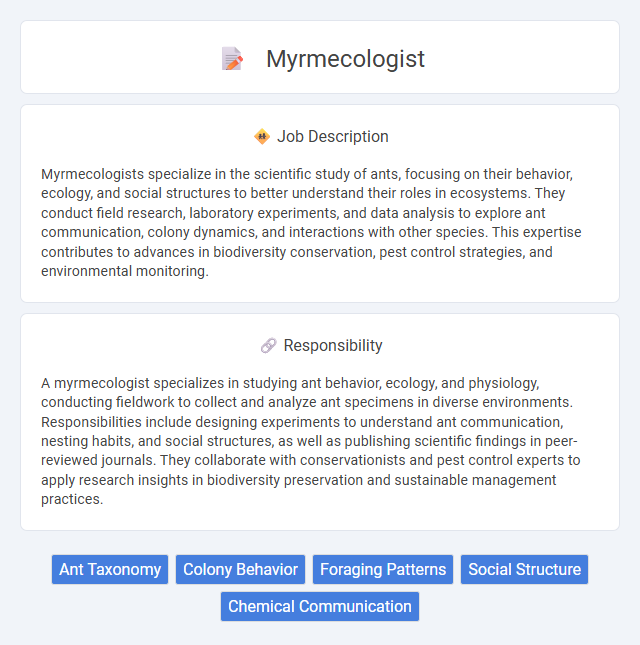
Myrmecologists specialize in the scientific study of ants, focusing on their behavior, ecology, and social structures to better understand their roles in ecosystems. They conduct field research, laboratory experiments, and data analysis to explore ant communication, colony dynamics, and interactions with other species. This expertise contributes to advances in biodiversity conservation, pest control strategies, and environmental monitoring.
Individuals with strong observational skills and patience are likely suitable for a myrmecologist role, as the job demands meticulous study of ants' behavior and habitats. Those who thrive in solitary fieldwork under varying environmental conditions probably find this career fulfilling. Candidates intolerant of prolonged outdoor exposure or repetitive tasks might struggle to adapt effectively to the demands of myrmecology.
Qualification
Myrmecologists typically require advanced degrees in entomology, ecology, or biology, with a strong emphasis on insect behavior and taxonomy. Practical experience in field research, specimen collection, and data analysis is essential for studying ant species effectively. Proficiency in molecular techniques and geographic information systems (GIS) enhances research capabilities in understanding ant ecology and evolution.
Responsibility
A myrmecologist specializes in studying ant behavior, ecology, and physiology, conducting fieldwork to collect and analyze ant specimens in diverse environments. Responsibilities include designing experiments to understand ant communication, nesting habits, and social structures, as well as publishing scientific findings in peer-reviewed journals. They collaborate with conservationists and pest control experts to apply research insights in biodiversity preservation and sustainable management practices.
Benefit
A myrmecologist may likely experience benefits such as contributing to scientific knowledge about ant behavior and ecosystems, which can support environmental conservation efforts. The role often involves opportunities for field research in diverse habitats, enhancing practical skills and professional growth. Financially, myrmecologists working in academia, government, or private sectors might receive competitive salaries and access to research funding.
Challenge
Myrmecologists likely face significant challenges in studying ant behavior due to the complexity and diversity of ant species, requiring careful observation and advanced research methods. The probability of encountering difficulties in fieldwork, such as locating and tracking colonies in various environments, is high. Laboratory analysis may also present obstacles in replicating natural conditions to understand ant ecology and social structures accurately.
Career Advancement
Myrmecologists specializing in ant behavior and ecology often advance their careers by conducting groundbreaking research, publishing influential studies, and collaborating with academic institutions or environmental organizations. Gaining expertise in fieldwork, laboratory techniques, and data analysis builds a strong foundation for leadership roles such as lead researcher or academic professor. Specialized skills in taxonomy, entomology, and conservation science enhance opportunities for securing grants and tenure-track positions in prestigious research facilities.
Key Terms
Ant Taxonomy
A myrmecologist specializing in ant taxonomy conducts detailed classification and identification of ant species, contributing to the understanding of their biodiversity and evolutionary relationships. This role involves morphological analysis, molecular techniques, and the maintenance of taxonomic databases essential for ecological and conservation research. Expertise in ant taxonomy aids in discovering new species and informs pest management and habitat preservation strategies.
Colony Behavior
Myrmecologists specializing in colony behavior analyze social structures, communication methods, and division of labor within ant colonies to understand their complex organization. They use observational studies and experimental methods to investigate how environmental factors influence collective decision-making and resource allocation. Insights gained from studying ant colony behavior contribute to advancements in ecology, pest management, and biomimetic technology design.
Foraging Patterns
Myrmecologists study the complex foraging patterns of ants, analyzing their trail formation, resource allocation, and communication methods through pheromone signaling. Detailed observation and data collection on ant movement help reveal ecological impacts and optimize pest control strategies. Advanced tracking technologies, such as RFID tagging and computer modeling, enhance understanding of ant foraging dynamics in various environments.
Social Structure
A myrmecologist studies the complex social structure of ant colonies, analyzing caste systems, division of labor, and communication methods within colonies. Research focuses on how queens, workers, and soldiers interact to maintain colony efficiency and survival. Understanding these social dynamics provides insights into behavior, evolution, and ecological impact of ants.
Chemical Communication
Myrmecologists study the chemical communication systems used by ants to coordinate colony activities, such as foraging, defense, and reproduction. They analyze pheromones, which ants release to transmit signals that regulate behavior and social organization within the colony. Research in this field contributes to understanding social insect ecology and can inspire innovations in pest control and robotics.
 kuljobs.com
kuljobs.com